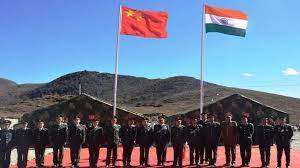Talking about talking : On an India-China dialogue
Narendra Modi and Xi Jinping need to have substantive conversations on ties
India and China have once again come away from their talks with starkly different views of their ties. The only talking point from last week’s brief conversation between Prime Minister Narendra Modi and Chinese President Xi Jinping on the sidelines of the BRICS Summit revolved around not what was said between them — which remains largely a mystery as is the way of “informal” conversations — but how it was said. The Ministry of External Affairs (MEA) released no statement on the talks, although Foreign Secretary Vinay Kwatra told reporters on August 24 that both had “underlined that the maintenance of peace and tranquillity in the border areas and observing and respecting the LAC are essential for the normalisation of the India-China relationship”. He added that they had decided to “direct their relevant officials to intensify efforts at expeditious disengagement and de-escalation”. A Chinese Foreign Ministry statement made no such mention, saying that Mr. Xi had said both sides “should bear in mind the overall interests” of ties and “handle properly” the border issue. The Chinese statement also said they had spoken at India’s request, prompting “official sources” in New Delhi to tell reporters that it was China that had requested a more structured bilateral meeting, which India had turned down.
The exchange in South Africa was only the second known interaction between the leaders since the start of the LAC crisis in 2020. It took the MEA as long as eight months to acknowledge they had discussed the border in a conversation initially described as “pleasantries” exchanged at the G-20 in Bali in November 2022. India had, at the G-20 as well, reportedly made clear it was not willing for a more structured sit down exchange, although as videos showed, it was Mr. Modi who finally initiated the conversation with Mr. Xi. If the Modi government is concerned that speaking formally with Mr. Xi would expose it to Opposition criticism over China or dilute its messaging on “abnormal” ties, the argument that a dialogue is some sort of concession or a victory for Beijing is not a serious one. What matters more is what is said in the dialogue. In fact, a structured dialogue at the upcoming G-20 in New Delhi, which Mr. Xi is expected to attend, would give the Prime Minister the opportunity to firmly underline India’s stand, in the clearest terms and at the highest level, that relations are predicated on peace and the future of the relationship hinges on China restoring the status quo and India’s patrolling rights along the borders. The only ostensible reason for India’s reluctance appears to be the government’s unfortunate prioritisation of political optics over public interest in its dealing with China, which has also led to continuing opacity over what is currently unfolding along the border.
